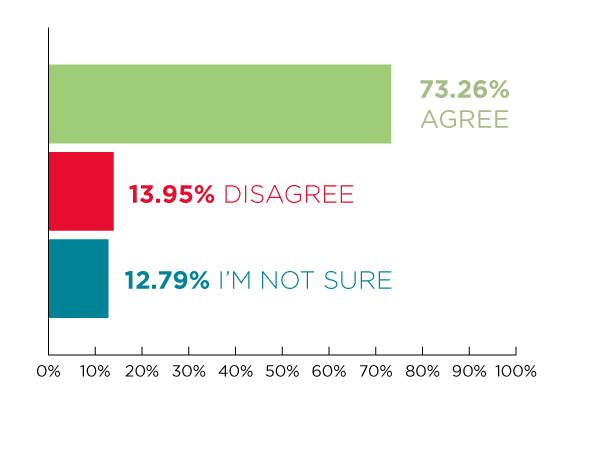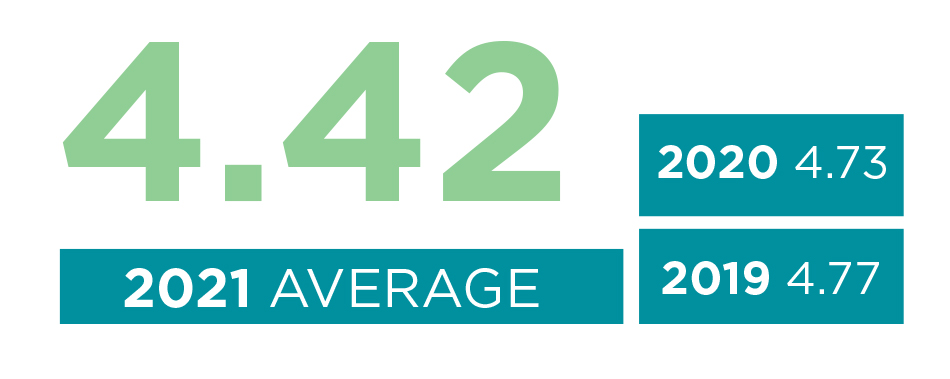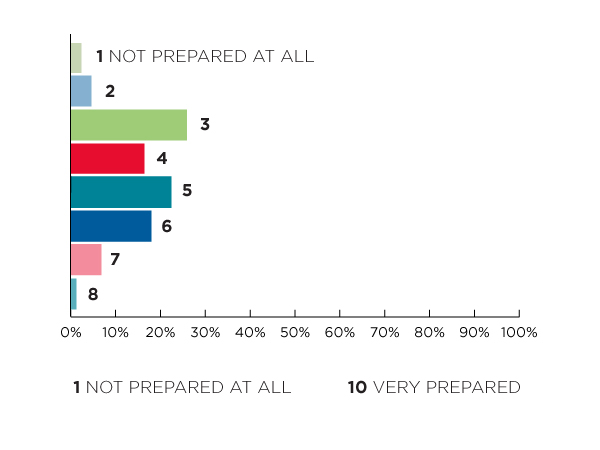The Business Record began releasing results from the 2021 Leader’s Survey in the Nov. 26 print edition. Our annual survey asks business leaders to share what they feel are some of the top issues affecting business in Central Iowa, and in particular the Greater Des Moines region.
The following is a selection of responses from leaders who opted to leave comments on questions related to the effects of remote work on downtown Des Moines and Iowa’s cybersecurity needs.
Agree or disagree: Downtown small businesses and commercial real estate will suffer if most businesses continue offering remote working to their employees post-pandemic.

Guest Editor Jake Christensen:
The vast majority of readers are concerned about the impacts of remote working on downtown. The responses focused on the restaurants and retail establishments negatively affected by fewer workers going out for lunch and shopping. There are many effects that remote work is having on downtown. The restaurants have had to adapt to fewer daytime customers, but many are experiencing higher evening sales because of the unique options available downtown.
Agree:
I believe “the workplace” is forever changed and it is incumbent on downtown small businesses and commercial real estate to adapt and innovate given the changing dynamic.
Jackie Norris, president, State Public Policy Group and Essman Research
Restaurants downtown are struggling. Many have eliminated lunch service because there aren’t people around. This also impacts happy hours and even dinner service as people who might have stayed downtown after work, have to choose to go downtown for dinner.
Jessica Dunker, president and CEO, Iowa Restaurant Association
I’m not sure about downtown small businesses as I think more people shop local than pre-2020, but restaurants and commercial buildings are sure to suffer in revenue, even if they are able to cut operating expenses. Also, employee turnover in restaurants is an additional expense.
April King, organizational change coach, American Enterprise Group
I’m not sure:
Remote work, properly managed, can lead to more employee satisfaction and equal or greater productivity, and reduce negative environmental impacts. On the other hand, downtown housing may recede and some service and hospitality businesses may suffer.
Thomas Swartwood, fellow, Pappajohn Entrepreneurship Center, Iowa State University
The next phase of downtown Des Moines is to make it an experience to continuously attract people there. The Farmers Market, the Soccer Stadium, Water Works Park, the Skate Park and Icon Water Trails create that experience. Investing in those amenities contribute to a vibrant downtown that attracts people.
Hannah Inman, CEO, Great Outdoors Foundation
Remote working will hurt, but the best businesses will figure out how to pivot to the new reality. It might be time to focus on the needs and wishes of those of us who live downtown; we’re able and willing to patronize.
Alan Feirer, owner, trainer and consultant, Group Dynamic
Disagree:
Adaptive reuse is overdue, as is decarbonization. Short term pain is inevitable. We need to avoid the longer term crisis looming.
Ryan Hanser, president, Hanser & Associates
I believe the market will settle more on more flexibility in the work environment rather than 100% remote or 100% office. With that flexible environment some users will need more space but just configured differently. Others will need less. Over time I do not see this as having a major impact on our downtown environment.
Rick Tollakson, CEO, Hubbell Realty Company
The ability to work from home will open up flexible work hours which can actually assist our community members ability to shop downtown where hours might be more limited if you are working 9-5. Commercial real estate can continue to evolve and adjust with the times. Where there used to be offices or manufacturing, there can be housing or quality of life opportunities. Our next challenge will be addressing the seniors in our communities with the aging baby boomers. Thinking pro-actively can alleviate current challenges and prepare for the future.
Michelle Redlinger, director, Washington Chamber of Commerce
How prepared do you perceive Iowa businesses/governments to be in protecting or defending against a cyberattack?
(Scale of 1-10, 1 being weakest)

Guest Editor Jake Christensen:
Leaders are very concerned about business and government’s abilities to protect and defend against cyberattacks. Leaders perceive that the threat of cyberattacks is rapidly changing and expanding, which makes this threat especially difficult for small businesses to defend against. There is a growing concern over the evolution of cyberattack tactics, lack of consequences for hackers, and many feel there is a strong need for more education with respect to prevention and mitigation.

7. Depends on size and type of business. In general small businesses — modest protection. Larger businesses — better protection due to larger budgets and staff. Government — concerned due to many older legacy systems.
Keith J. Gredys, chairman and CEO, Kidder Advisers, Inc.
6. The ones using a qualified consultant are in good shape.
Steve Heston, director, client engagement, Pratum
5. Cyber attacks are becoming increasingly more abundant. Every business, regardless of size and type, is subject to cyber attack extortion. I’m not sure anyone can be prepared enough.
Scott Turczynski, chief operating officer, Heartland Companies
4. For most businesses, cybersecurity is an afterthought.
Tray Wade, president and CEO, EveryStep
3. All businesses and public institutions are currently vulnerable to attacks by cyber criminals. At this point our best risk management tactics are to continue to invest in strong IT infrastructure, train staff to recognize and report attacks quickly, and to transfer this exposure carefully to a specialized insurance carrier that actively supports its customers in mitigating risks.
Jed Gammell, property and casualty insurance, vice president, Lincoln Savings Bank
3. The pace that cyberattacks are happening utilizing new and different tactics and the volume of cyberattacks on organizations of all sizes make me deeply concerned about our ability to respond.
Jackie Norris, president, State Public Policy Group and Essman Research
3. Iowa businesses and government will need to increase cybersecurity spending as this seems to be an attack without an end. Ending ransomware payments via cyber currency would be a start to thwarting the attacks.
Mike Zuendel, founder and CEO, Legacy Bridge Private Family Offices
1. We have a very open network that is good for collaboration, communication and economic development, however, that also makes it very easy for malicious activity to occur. In a perfect world everybody would band together and collaborate, but unfortunately, cultures like those of scammers do not allow us to have the freedom on the internet we wish for.
Steele Harter, director of economic development research, Ames Chamber of Commerce